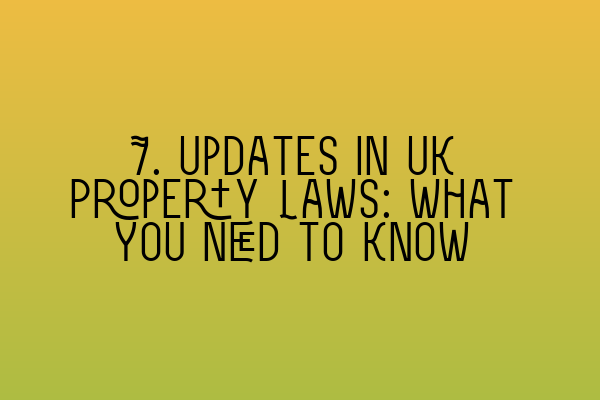Updates in UK Property Laws: What You Need to Know
As a leading property law firm, SQE Property Law & Land Law is committed to keeping our clients informed about the latest updates in UK property laws. With the ever-changing landscape of property regulations, it is important for property owners, buyers, sellers, and investors to stay up-to-date to navigate the legal complexities with ease. In this article, we will discuss seven important updates in UK property laws that you need to know.
1. Stamp Duty Land Tax Changes
One of the most significant updates in UK property laws is the recent changes to Stamp Duty Land Tax (SDLT). The government has introduced a temporary holiday on SDLT for residential properties up to a certain value. This has led to a surge in property transactions and an opportunity for buyers to save on tax. To understand how these changes could benefit you and for more information about the current SDLT rates, consult our SQE 1 Practice Exam Questions.
2. Leasehold Reform
The government is addressing concerns around leasehold properties with proposed reforms. The aim is to make leasehold ownership fairer and more transparent. Key proposals include limiting ground rent charges and giving leaseholders the right to extend their leases. These reforms will significantly impact the rights and obligations of both leaseholders and freeholders. If you are a leaseholder or considering purchasing a leasehold property, it is essential to understand how these changes may affect you. Our SQE 1 Practice Mocks FLK1 FLK2 will help you explore related legal scenarios and understand the implications in detail.
3. Energy Efficiency Requirements
From April 2025, landlords in the private rental sector will be required to meet higher energy efficiency standards. The Minimum Energy Efficiency Standards (MEES) mean that properties with an energy performance certificate (EPC) rating of less than E cannot be rented out. Landlords need to assess and make necessary improvements to meet these requirements. Non-compliance can result in financial penalties and restrictions on renting out the property. To ensure compliance and avoid potential legal issues, it is important for landlords to familiarize themselves with the new energy efficiency standards and take appropriate action. Our SQE 2 Preparation Courses can equip you with the knowledge and skills required to tackle such legal challenges effectively.
4. Renters’ Rights
The government has introduced measures to strengthen renters’ rights and provide more security. One key change is the abolishment of section 21 notices, often known as “no-fault evictions,” which allowed landlords to evict tenants without giving a reason. The government is now focusing on improving the quality of rental properties and ensuring fair treatment for tenants. If you are a tenant, it is important to understand your rights and know where to seek legal assistance in case of any disputes or issues. Our SQE 1 Preparation Courses can give you a solid foundation of knowledge in property law, including renters’ rights and landlord obligations.
5. Building Safety Regime
Following the tragic Grenfell Tower fire in 2017, the government has taken steps to improve building safety regulations. The introduction of the Building Safety Bill aims to strengthen the regulatory framework, enhance fire safety standards, and establish the Building Safety Regulator. This is in response to concerns regarding the safety of high-rise buildings and the responsibilities of developers, building owners, and managing agents. If you are involved in property development, ownership, or management, it is crucial to stay informed about the new building safety regime and ensure compliance with the evolving regulations.
6. Commercial Rent Arrears Recovery (CRAR)
The existing commercial rent arrears recovery process has undergone some changes recently. Commercial landlords now require 366 days of arrears instead of the previous 7 days before exercising CRAR. This change is significant for both landlords and tenants, highlighting the importance of timely rental payments and understanding the implications of non-payment. If you are involved in commercial property leasing, it is advisable to seek legal advice to fully comprehend how these changes may affect your rights and obligations.
7. Breathing Space Scheme
The government has introduced a new Breathing Space scheme to provide individuals in debt with legal protections. This scheme gives individuals a pause from enforcement action and offers them time to seek debt advice and formulate a repayment plan. While this update may not directly relate to property ownership, it is an important development that can have implications for individuals involved in property transactions. It is crucial to be aware of this scheme’s impact on debt recovery processes and seek legal advice to navigate any associated property-related issues.
Understanding and staying informed about updates in UK property laws is essential for all parties involved in property transactions and ownership. By keeping abreast of these changes and seeking professional advice when needed, you can ensure compliance and protect your rights and interests.
If you require further information or professional assistance with property law matters, feel free to contact SQE Property Law & Land Law. We are here to help you navigate through the legal intricacies and achieve your property goals.
For the SRA SQE exam dates and comprehensive preparation resources, visit our page on SRA SQE Exam Dates.
